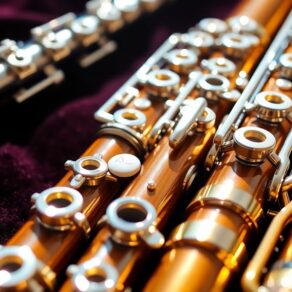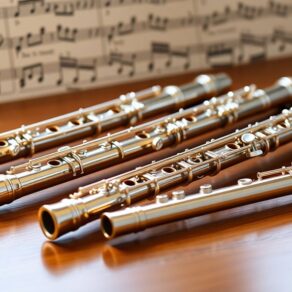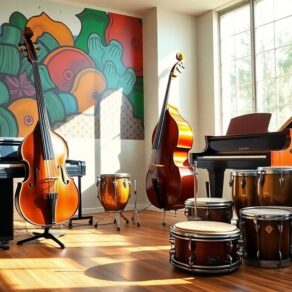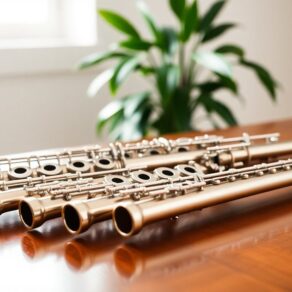When searching for the best budget-friendly flutes for students, consider reliable brands like Yamaha, Gemeinhardt, and Jupiter. Models such as the Yamaha YFL-221 and Gemeinhardt 2SP are known for their sound quality and ease of playability. Look for features like silver-plated headjoints and ergonomic designs that enhance comfort. Prices usually range under $300, making quality instruments accessible. Don't overlook second-hand options if you're on a tight budget. Remember, choosing the right flute can make a significant difference in the learning experience. You might find even more insights that will help you make an informed decision.
Key Takeaways
- Yamaha YFL-221 and Gemeinhardt 2SP are highly recommended for their durability, sound quality, and playability, ideal for student flutists.
- Jupiter JFL511 and Pearl 505 offer innovative designs and responsive keys, enhancing the learning experience with bright and clear sounds.
- Mendini by Cecilio is an affordable option that includes essential accessories, making it great for beginner players on a budget.
- Consider local music stores for hands-on trials and expert advice, or explore online retailers for extensive selections and price comparisons.
- Regular maintenance, including cleaning and proper storage, ensures longevity and optimal performance of budget-friendly flutes.
Top Affordable Flute Brands
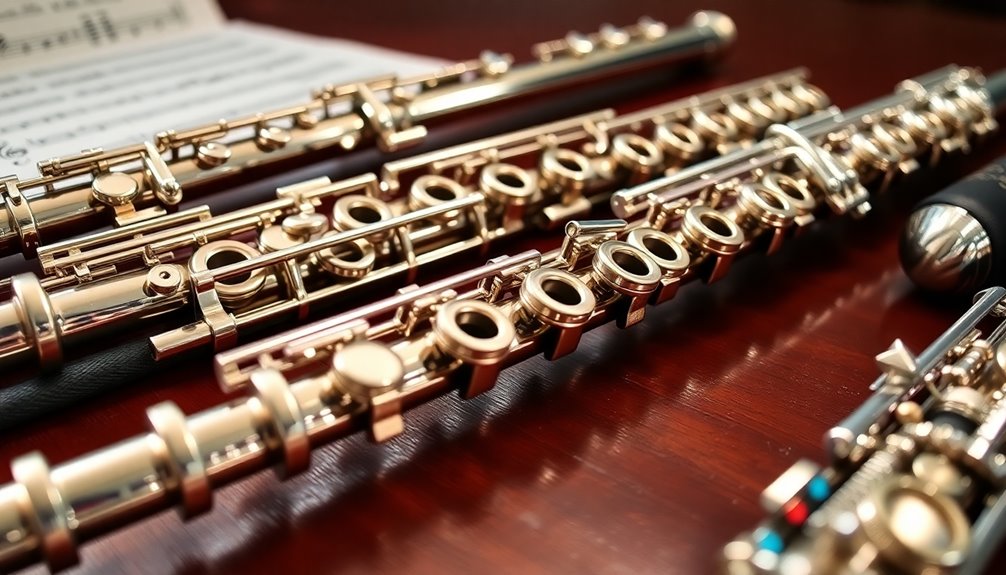
Finding the right flute can be a game-changer for students, especially when budget constraints come into play. You want an instrument that not only fits your budget but also supports your journey as a budding musician.
Let's explore some top affordable flute brands that can help you shine without breaking the bank.
Yamaha is a popular choice among students and educators alike. Known for their durable flute materials and consistent quality, Yamaha flutes often come in a variety of models suited for beginners. Their student lines, like the YFL-221, provide excellent playability and sound, making them a reliable option.
Another brand worth considering is Gemeinhardt. They offer quality flutes at competitive prices and are recognized for their smooth tone and responsive keys. The Gemeinhardt 2SP is particularly well-regarded, often praised for its ease of use, making it a favorite among beginners.
If you're looking for something a bit different, try the Jupiter brand. They're known for their innovative designs and excellent craftsmanship. The Jupiter JFL511 is a solid choice, featuring a silver-plated headjoint that enhances sound quality while staying budget-friendly.
When you compare these brands, consider your personal preferences and playing style. Each brand has its unique strengths, but they all offer a solid foundation for your flute-playing journey. Additionally, many of these brands, such as Yamaha and Gemeinhardt, provide extended warranties that can give beginners peace of mind during their learning process.
Features to Consider
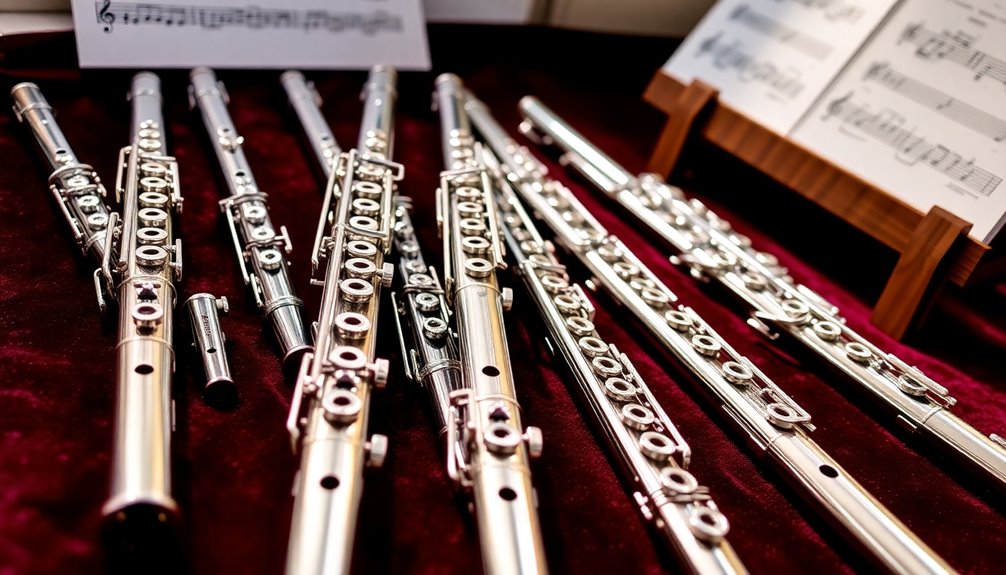
When choosing a budget-friendly flute, several key features can greatly impact your playing experience and overall satisfaction. Understanding these features will help you select the right instrument that meets your needs, enhances your skills, and fosters a sense of belonging in the music community.
One essential aspect to take into account is the material options. Flutes are typically made from silver-plated nickel, solid silver, or even plastic for beginners. Each material affects the flute's weight, sound, and durability. Here's a breakdown of common materials:
| Material | Performance Quality | Ideal For |
|---|---|---|
| Silver-Plated | Bright, focused sound | Intermediate players |
| Solid Silver | Rich, warm tone | Advanced musicians |
| Plastic | Lightweight and durable | Beginners |
Another significant factor is the mechanical design. Look for features like offset G keys or closed hole keys, which can enhance your comfort and playing technique. This can make a big difference in your performance quality, especially as you progress. Additionally, seeking instruments from reputable brands like Yamaha can ensure you receive a quality flute that suits your needs.
Finally, take into account the flute's overall finish and aesthetics. An attractive flute can inspire you to practice more and share your music with others.
Best Flutes Under $300
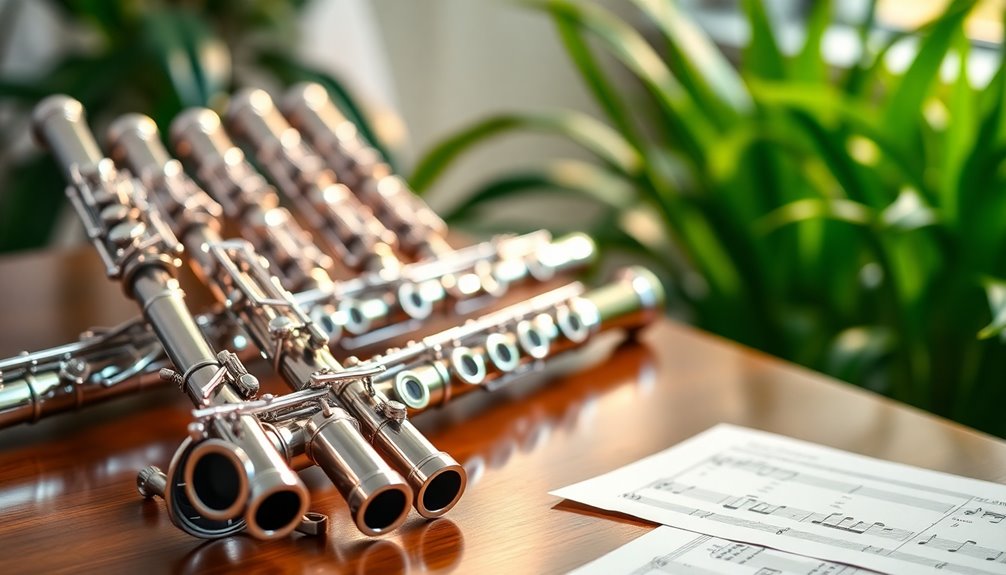
Choosing the right flute under $300 can greatly enhance your musical journey without breaking the bank. As a budding flutist, you might be overwhelmed by the choices available, but you don't need to be. Focusing on quality and playability will guarantee you get the most out of your investment.
When selecting a flute, look for models that come with essential student flute accessories, like a cleaning rod and a case. These items help you maintain your instrument, making sure it stays in great shape as you learn. A reliable flute will support your growth and encourage you to practice more consistently.
For beginners, ease of play is vital. You'll want a flute that responds well to your beginner playing techniques, allowing you to produce clear notes without excessive effort. Features like a closed hole design can make it easier to cover the tone holes, which is especially beneficial as you're just starting out.
Consider brands known for their student-friendly instruments. Many companies offer flutes that not only fit your budget but also provide the sound quality you need to thrive. Remember, your first flute is a stepping stone in your musical journey, and it should inspire you to explore and enjoy your instrument.
Additionally, exploring best student flutes can help you find models that are designed specifically for young musicians, ensuring you make a wise choice. Ultimately, investing in a well-made flute under $300 will support your development as a musician, making it easier to learn, practice, and perform with confidence.
Embrace the journey ahead, and let your passion for music flourish!
Recommended Beginner Models
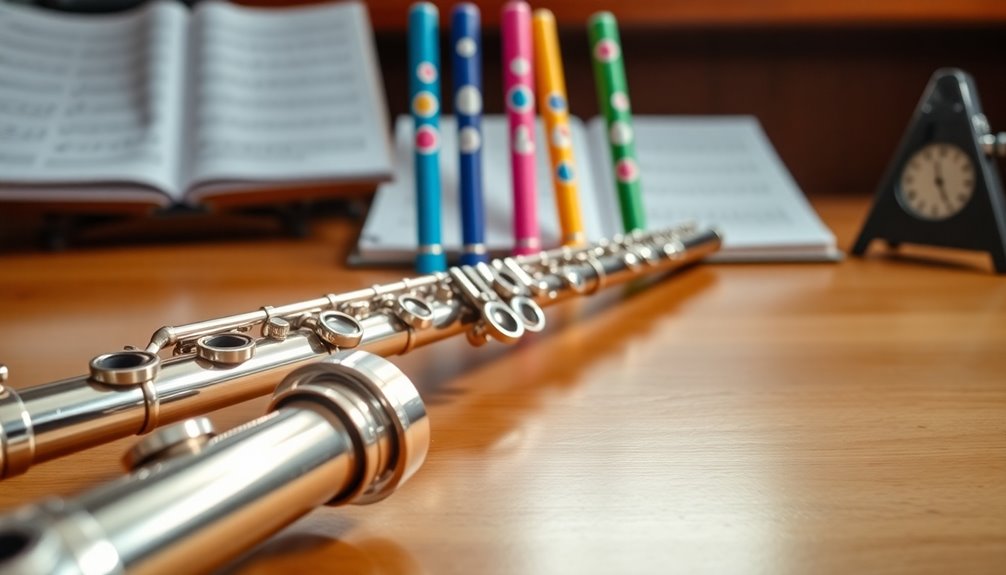
As you commence your flute-playing journey, it's helpful to know which beginner models can set you up for success. Choosing the right beginner flute types won't only enhance your learning experience but also foster a sense of belonging in the musical community.
One popular option is the Yamaha YFL-221. Known for its excellent flute sound quality, this model features a solid silver headjoint, which produces a warm tone that's essential for any budding flutist. Its durable construction makes it reliable for daily practice and performances alike.
Another great choice is the Pearl 505. This instrument is renowned for its ease of playability and responsive keys, perfect for students who are just starting. The combination of a silver-plated body and a headjoint contributes to a bright and clear sound, which can boost your confidence as you play.
For those on a tighter budget, the Mendini by Cecilio is an affordable option that doesn't compromise on quality. This model offers decent flute sound quality and includes accessories like a case and cleaning kit, making it a practical choice for new players. Additionally, it encourages good instrument care habits to ensure longevity.
Lastly, the Gemeinhardt 2SP is a reliable beginner flute that boasts a robust design and a pleasing tone. Many students find it easy to handle and play, allowing for a smoother shift into more advanced techniques.
Pros and Cons of Each
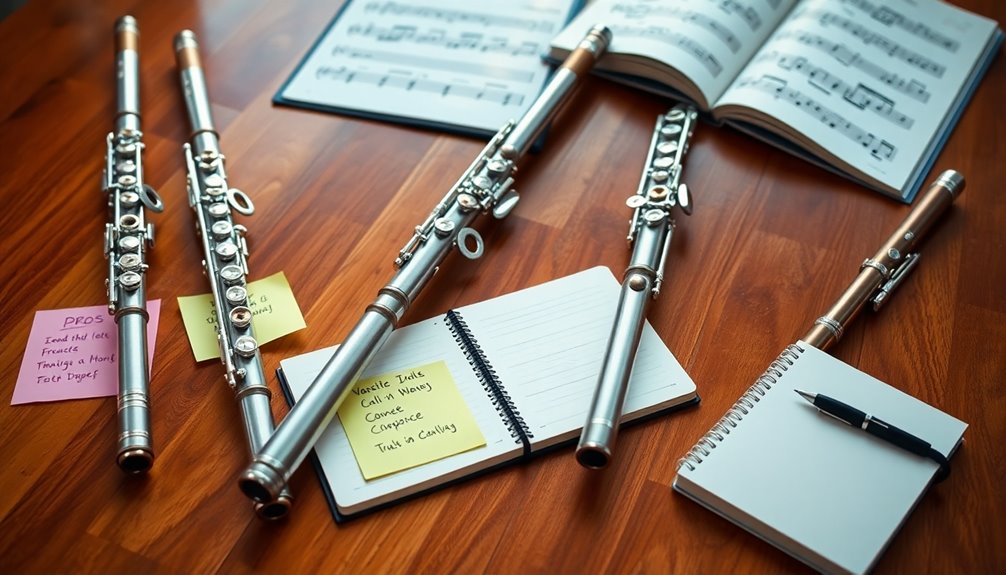
Evaluating the pros and cons of each beginner flute model can help you make an informed choice tailored to your needs.
By understanding these factors, you can align your selection with your student preferences and guarantee a smoother musical journey.
Here's a breakdown of the pros and cons for you to ponder:
1. Material Quality
Pros: Many budget flutes are made from durable materials, guaranteeing longevity.
Cons: Some may use lower-quality metals, affecting sound quality over time.
2. Playability
Pros: Budget flutes are often designed for ease of use, perfect for beginners.
Cons: You may find some models challenging if they lack ergonomic features.
3. Sound Quality
Pros: You can still find flutes that produce a decent sound, great for students.
Cons: However, they mightn't have the richness and depth of higher-end models.
4. Price Point
Pros: Affordability makes these flutes accessible, even on a tight budget.
Cons: You risk sacrificing some features, which could impact your learning experience.
As you weigh these pros and cons, think about what matters most to you as a student.
Additionally, consider the key features to look for when selecting a flute, as they can greatly influence your playing experience.
Whether it's sound quality, playability, or price, knowing the strengths and weaknesses of each flute model will help you feel more confident in your decision.
Maintenance Tips for Students
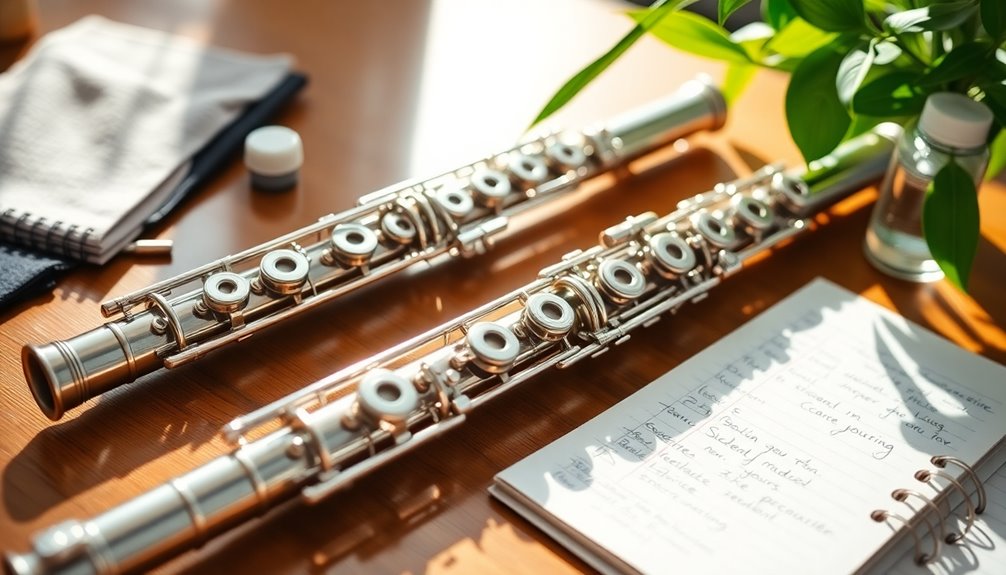
Taking care of your flute is just as important as selecting the right model for your musical journey. By incorporating some simple maintenance practices, you'll guarantee your instrument stays in top shape and sounds its best.
Start with daily cleaning techniques. After each practice session, gently wipe down the exterior with a soft cloth to remove fingerprints and moisture. Inside, use a cleaning rod with a swab to clear away any condensation. This not only keeps your flute shiny but also prevents buildup that could affect sound quality.
In addition to daily care, don't forget about regular inspections. Every few weeks, take a moment to check for any visible issues like loose screws or pads that may need replacing. If you notice anything unusual, it's best to consult a music professional or your teacher for advice. They can guide you on what repairs or adjustments might be necessary, guaranteeing your flute continues to perform well. Regular maintenance, such as using a flute cleaning kit, is essential for enhancing the instrument's lifespan.
Finally, store your flute properly. When you're not playing, keep it in its case to protect it from dust and accidental damage. This small habit can make a big difference over time.
Where to Buy Budget Flutes
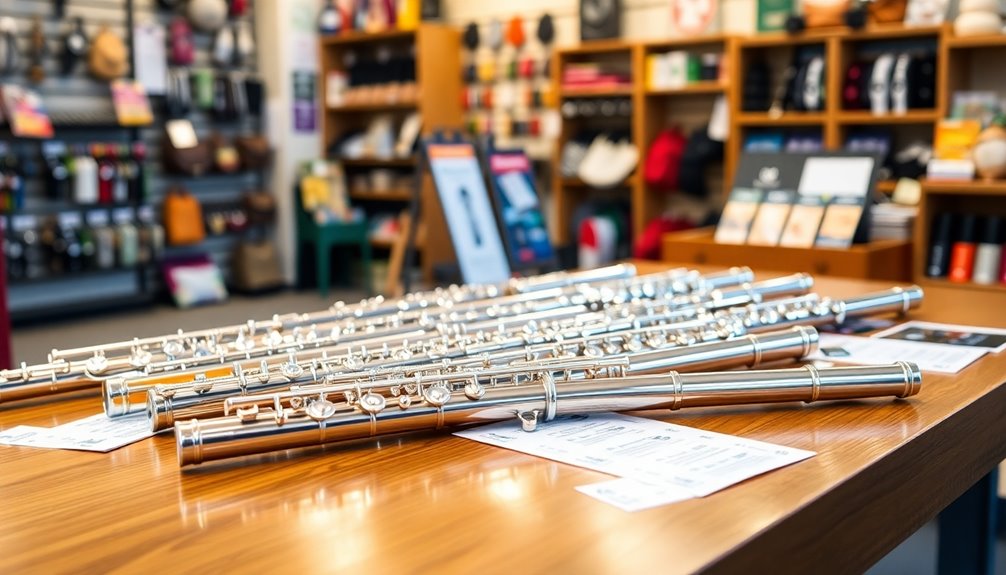
Finding the right budget flute can feel overwhelming, but plenty of options are available for students without breaking the bank.
Whether you're just starting or looking to upgrade, knowing where to shop can make all the difference.
Here are some great places to explore when buying your budget flute:
- Local Music Stores: Visiting a local music store is a fantastic way to try out flutes in person. You can get hands-on experience and often receive valuable advice from knowledgeable staff.
- Online Retailers: Websites like Amazon, Sweetwater, or Woodwind & Brasswind offer a wide selection of budget-friendly flutes. You can read customer reviews and compare prices from the comfort of your home.
- Second-Hand Marketplaces: Platforms like eBay or Facebook Marketplace often have great deals on used flutes. Just make sure to check the condition and ask questions before purchasing.
- School Music Programs: Don't overlook your school's music department! They may have flutes available for rent or purchase at a lower cost, and you'll be supporting your local music community. Additionally, many local music stores have affordable beginner flutes that cater specifically to new players.
Frequently Asked Questions
Can I Rent a Flute Instead of Buying One?
Absolutely, you can rent a flute instead of buying one!
Flute rental offers several benefits, like lower upfront costs and flexibility to switch instruments as your skills grow. It's a great way to explore your interest without making a hefty investment.
Plus, many rental programs provide maintenance and repair services, so you won't have to worry about extra expenses. Renting could be the perfect solution while you decide if this is the right path for you.
How Do I Choose the Right Flute Size?
Choosing the right flute size is essential for your comfort and playing success.
Start by checking flute measurements to guarantee the instrument fits your hands and body. A flute that's too big or small can cause strain and impact your learning.
Consider trying different sizes at a music store, and don't hesitate to ask for help.
Finding the perfect fit will make your flute journey enjoyable and help you feel more confident as you play.
What Accessories Do Beginner Flutists Need?
When starting out, you'll want to get your ducks in a row.
Essential cleaning supplies like a cleaning rod, cloth, and swab are vital for proper flute maintenance. These tools help you keep your instrument in top shape, ensuring a smooth sound.
Don't forget a sturdy case to protect your flute when you're not playing.
With these accessories, you'll feel confident and ready to plunge into your musical journey!
How Long Should I Practice Daily as a Beginner?
As a beginner, aim for at least 30 minutes of practice daily. Consistency is key! You can break it into shorter sessions if that helps.
Focus on effective techniques, like proper breathing and finger placement, to build your skills. Establish practice routines to keep you motivated and engaged.
Are Used Flutes a Good Option for Students?
When it comes to finding your musical voice, a used flute can be a treasure chest of possibilities.
The benefits of a used flute are plenty; you'll save money while still enjoying quality sound, which can greatly enhance your student performance.
Plus, you're joining a community of musicians who understand the journey.
Just make sure it's in good condition, and you'll be well on your way to creating beautiful melodies without breaking the bank.
Conclusion
In your musical journey, choosing the right flute is like finding the perfect key to access your potential. With so many budget-friendly options available, you can easily discover a model that suits your needs without breaking the bank. Remember to reflect on the features that matter most to you and explore the recommended models. With proper care and maintenance, your flute can be a trusted companion, helping you create beautiful melodies as you grow as a musician.

